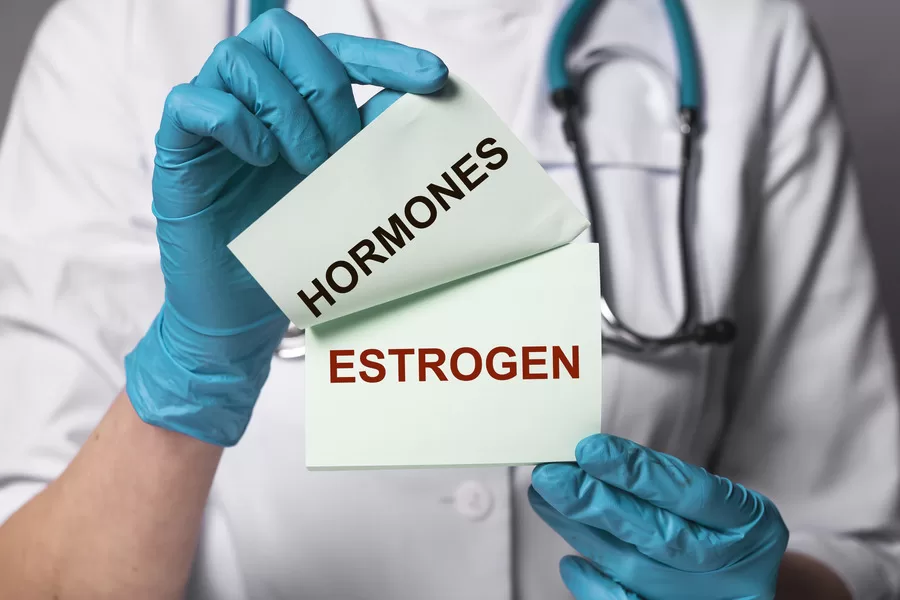
Did you know that men also need estrogen, just like women do? Estrogen, a hormone we usually connect with women, is actually super important for men’s health too! It’s involved in many body processes, like keeping bones strong, brains sharp, and hearts healthy.
Estrogen is
Think of estrogen as the conductor of an orchestra, guiding various functions in your body to create a harmonious symphony. It’s a hormone that’s about more than just reproduction – it touches everything from your bones to your brain. Let’s dive into the details of this crucial hormone with simplicity and clarity.
The Birthplace of Estrogen
Women’s ovaries are the main producers of estrogen, especially during the fertile years. Men make it too, but through a different route: their bodies convert some testosterone (a male hormone) into estrogen. For both, a little bit is also made in the adrenal glands, the brain, and even in fat cells – showing just how widespread its influence is!
Estrogen’s Role Call
- Guardian of Bones: Estrogen helps bones absorb the minerals they need to stay strong and repairs them as needed. It’s like the body’s bone quality assurance team!
- Heart’s Ally: It works to keep cholesterol in check and maintains the flexibility of blood vessels, making it a quiet hero for cardiovascular health.
- Mood Modifier: Feelings fluctuate with estrogen levels, highlighting its role in the brain and nervous system. It’s not just about mood swings; it’s about overall emotional well-being.
- Skin’s Secret: Estrogen helps skin stay hydrated, thick, and elastic. It’s like a natural spa treatment from the inside out!
- Master of Metabolism: It influences how your body uses carbs and cholesterol, showing its reach extends to your energy levels and overall health.
Regulating Estrogen Levels
To maintain optimal estrogen levels, prioritize a well-balanced diet rich in fruits and vegetables. Engage in consistent physical activity and effectively manage stress levels. Abstaining from excessive alcohol use and refraining from smoking might also be beneficial. Occasionally, physicians may recommend pharmacological interventions or other therapies to provide assistance.
Checking Your Levels
If you’re worried about your estrogen, a doctor can do a simple blood test to check your levels. They can help you understand what the numbers mean and what to do about them.
Remember, everyone’s body is different, so what’s normal for one person might not be for another. If you have questions or concerns about your estrogen levels, the best person to talk to is your healthcare provider. They can guide you through understanding your body and keeping it healthy!
Detailed Symptoms of Estrogen Imbalance in Men
Estrogen, often overshadowed by its prominence in women’s health, plays a crucial role in men’s bodies as well. However, when levels are imbalanced, it can lead to several noticeable and often disruptive symptoms. Understanding these symptoms, and how they vary with age, can help men seek timely advice and treatment.
Common Symptoms of Estrogen Imbalance in Men
- Gynecomastia (Breast Tissue Development): An excess of estrogen can lead to the development of breast tissue in men, a condition known as gynecomastia. It’s not just a physical change but can also be psychologically distressing.
- Erectile Dysfunction and Libido Changes: Estrogen imbalances can significantly affect sexual health. Increased estrogen might lead to a decreased libido and difficulties achieving or maintaining an erection.
- Emotional Instability: Just as in women, estrogen in men is linked to mood regulation. Imbalances might contribute to feelings of depression, irritability, or mood swings.
- Weight Gain: Particularly increased fat around the abdomen can be a sign of elevated estrogen levels. Estrogen influences fat distribution in the body, and imbalances can lead to noticeable changes in body composition.
- Fatigue: A general sense of tiredness or lack of energy can also stem from hormonal imbalances, including estrogen.
- Muscle Mass and Strength Changes: Estrogen plays a role in muscle maintenance and repair. Men with imbalanced estrogen might notice a decrease in muscle mass or strength.
- Bone Health Issues: While often associated with women, men with low estrogen levels can also suffer from weakened bones, increasing the risk of fractures and osteoporosis.
Personalized Understanding
Every individual’s experience with hormonal imbalance is unique. Factors like genetics, overall health, lifestyle, and concurrent medications all play roles in how symptoms manifest and should be considered when evaluating symptoms. Moreover, symptoms can be subtle or mistaken for other health issues, making awareness and regular health check-ups critical.
Recognizing the signs of estrogen imbalance in men and understanding how these symptoms may change with age are key steps in maintaining optimal health. Men experiencing any of these symptoms should discuss them with a doctor, who can offer advice, diagnosis, or treatment options based on a comprehensive health assessment. Early intervention and lifestyle adjustments can significantly mitigate the impact of estrogen imbalance on men’s health and quality of life.
Balance Your Estrogen
Let’s cut through the noise and get to the practical ways you can balance estrogen levels for a healthier life:
- Move More: Lace up those sneakers and get moving! Exercise helps balance not just your weight but your hormones too. Whether it’s a brisk walk, a cycle around the park, or lifting weights, staying active is key.
- Nourish Your Body: Think of food as your hormone helper. Vegetables, fruits, lean meats, and whole grains can all contribute to a better hormone balance. Be mindful of processed and high-fat foods, as they can do the opposite.
- Rest Up: Your body fixes itself while you sleep, including balancing hormones. Aim for 7-9 hours of good quality sleep each night.
- Keep Calm: Stress can wreak havoc on hormones. Find stress-busting activities that work for you, like meditation, reading, or gardening.
- Drink and Smoke Less: Too much alcohol and any smoking can increase estrogen levels. Cutting back can help restore balance.
- Check Up Regularly: Sometimes, you need a pro. Regular check-ups with your doctor can catch and correct hormone imbalances early.
Adopting these habits won’t just help balance estrogen; they’ll likely improve your overall health and well-being. Start small, and be consistent for the best results!
Foods to Naturally Elevate Estrogen
Looking for a natural estrogen boost? Here are some foods you might not have thought of that could help balance your hormones in a tasty way.
- Soy. Not just a vegetarian delight, soybeans and products like tofu and soy milk are brimming with plant estrogens. They’re versatile in recipes, from smoothies to stir-fries.
- Flaxseeds. Small but packed with a punch, flaxseeds are a powerhouse of plant-based estrogen. Grind them up and sprinkle over your breakfast or salads for an easy add-on.
- Dried Fruit. Apricots, dates, and prunes are not just for baking. Their sweet, chewy goodness is also a source of estrogen-like compounds. Mix them into trail mixes or enjoy as a standalone snack.
- Sesame Seeds. More than a garnish, sesame seeds are a subtle source of plant estrogens. Add them to your meals for a nutty flavor and a hormonal boost.
- Garlic’s. It’s known for its flavor, but garlic also contains compounds that might help regulate estrogen. It’s an easy addition to most savory dishes.
- Oats and Barley. Not just for breakfast, oats and barley are hearty grains that bring a wholesome boost of nutrients and potential estrogenic benefits to your table.
- Nutty Nutrition. Nuts are not just tasty and filling. They also carry phytoestrogens in their compact forms, making them a smart, nutritious snack.
Exercises and Workouts to Normalize Estrogen Levels in Men
Maintaining balanced estrogen levels is crucial for men’s overall health. Engaging in regular physical activity is one of the most effective ways to help normalize these levels. Here’s a look at various exercises and workouts specifically beneficial for managing estrogen:
Strength Training
- Why It Helps: Lifting weights or engaging in body resistance exercises can increase muscle mass and decrease body fat, which in turn can help regulate hormone levels, including estrogen.
- Recommended Routine: Incorporate 2-3 days of strength training per week, focusing on major muscle groups. This can include free weights, machines, or bodyweight exercises like push-ups and squats.
High-Intensity Interval Training (HIIT)
- Why It Helps: HIIT workouts are known to boost metabolism and improve body composition rapidly. This type of training can reduce fat mass, a significant contributor to estrogen production in men.
- Recommended Routine: Try short bursts of high-intensity exercises like sprinting or jump roping followed by brief rest periods, 2-3 times a week.
Cardiovascular Exercise
- Why It Helps: Regular cardio helps in reducing fat, improving heart health, and enhancing metabolism, all of which are beneficial for hormonal balance.
- Recommended Routine: Engage in activities like running, cycling, or swimming for 150 minutes of moderate-intensity, or 75 minutes of high-intensity aerobic activity per week, as recommended by health guidelines.
Flexibility and Balance Training
- Why It Helps: Yoga and Pilates improve flexibility, reduce stress, and can positively influence hormone levels by enhancing mind-body connection and reducing cortisol, a stress hormone that can affect estrogen levels.
- Recommended Routine: Include a session of yoga or Pilates 1-2 times per week to complement your strength and cardio routines.
Recreational Sports
- Why It Helps: Engaging in recreational sports like basketball, soccer, or tennis can be a fun way to incorporate physical activity into your routine. These sports combine cardiovascular, strength, and flexibility training.
- Recommended Routine: Participate in team sports or recreational activities at least once a week for fun and varied exercise.
By incorporating these exercises and workouts into your routine, you can help normalize estrogen levels and improve your overall health. Remember, before starting any new exercise program, especially if you have health concerns or existing conditions, consult with a healthcare provider to tailor the right program for your
Alternative Therapies for Managing Estrogen Levels
When it comes to balancing estrogen levels, the journey doesn’t end with conventional medicine. Many individuals turn to alternative or complementary therapies as adjuncts to mainstream treatment. These therapies can range from ancient practices like acupuncture to modern-day herbal supplements. Here’s a brief look at some alternative approaches:
Acupuncture
- How It Works: This traditional Chinese medicine technique involves inserting very thin needles into specific points on the body. It’s believed to correct imbalances in the flow of energy (qi) through channels known as meridians.
- Estrogen Connection: Acupuncture might help regulate hormone function, reduce stress, and improve circulation, all of which could potentially affect estrogen levels and alleviate symptoms of imbalance.
Herbal Supplements
- Phytoestrogens: Certain plants contain compounds known as phytoestrogens that mimic estrogen in the body. Common examples include flaxseeds, soy products, and red clover. They might help balance estrogen levels naturally.
- Adaptogens: Herbs like ashwagandha and Rhodiola are considered adaptogens, meaning they might help the body resist stressors. By mitigating stress, these herbs might indirectly influence hormone levels, including estrogen.
By integrating these alternative therapies with conventional treatments and lifestyle changes, many individuals find a holistic approach to managing their estrogen levels. Remember, the goal is to create a tailored, effective plan that promotes overall health and hormonal balance.
Conclusion
Both men and women require estrogen for various functions including bone density, cardiovascular health, mood regulation, and maintaining skin elasticity. Men can experience specific symptoms from estrogen imbalance, such as gynecomastia, mood changes, and shifts in sexual function, which vary with age. Regular exercise, a balanced diet, stress management, and avoiding excessive alcohol and smoking are crucial for maintaining healthy estrogen levels. Alongside traditional treatments, acupuncture, herbal supplements, and mindful practices can complement efforts to balance estrogen but should be pursued with professional guidance. Understanding individual estrogen levels through medical consultation and routine check-ups is vital for early detection and management of hormonal imbalances.
FAQs
Estrogen in men is crucial for maintaining bone density, supporting cardiovascular health, modulating mood, and contributing to overall reproductive health.
Symptoms of estrogen imbalance in men include gynecomastia, mood swings, erectile dysfunction, fatigue, and changes in weight or muscle mass. Blood tests ordered by a healthcare provider can confirm hormone levels.
Living a healthy life is key. Eat well, stay active, keep stress under control, and don’t smoke or drink too much. And of course, regular visits to the doctor can help keep everything in check.
Yes, indeed! What you eat, how much you move, and how you deal with stress can all affect your hormones. Making good choices every day can lead to better health and better hormone balance.







